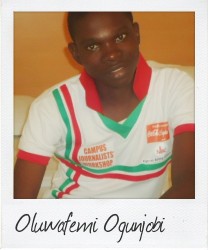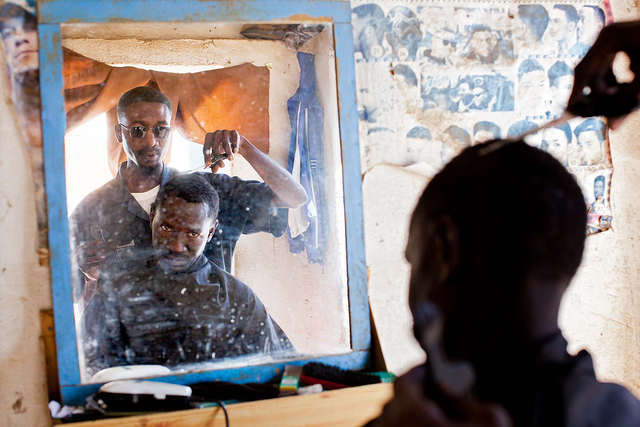"I barb, I wash my colleagues' clothes for money"
January 27 Akande Olanrenwaju Kabiru started the ‘Clippers and Pegs’ laundry and barber business when he was admitted into Obafemi Awolowo University. Oluwafemi Ogunjobi, 21, a Correspondent from Gbongan in Nigeria, ran into him, and discovered his joy of washing his colleagues’ wears.
Akande Olanrenwaju Kabiru started the ‘Clippers and Pegs’ laundry and barber business when he was admitted into Obafemi Awolowo University. Oluwafemi Ogunjobi, 21, a Correspondent from Gbongan in Nigeria, ran into him, and discovered his joy of washing his colleagues’ wears.
When Kabiru Olanrenwaju Akande bagged a National Diploma at the Obafemi Awolowo University (OAU), Ile-Ife, Osun state, he was hopeful about getting a moderate-income white-collar job to sustain himself.
But with such a certificate, no such opportunity arose. He thought of getting a degree to achieve his aim. Then, he obtained a direct entry form to study in the same institution.
The same year that Kabiru was leaving after finishing his diploma course, his parents retired from the civil service. There was no financial means to see him through school. Life was ‘hell’ for him. This prompted him to learn vulcanizing to pay his fees. He saved some money from that trade and used it to start ‘Clippers and Pegs’, a barbering and laundry service outfit that he operated when he was admitted for a degree programme to study Public Administration.
Last year, Kabiru graduated with a Second Class Lower Division, but his belief in white-collar jobs has changed. Although still waiting to be mobilized for the National Youth Service, Kabiru does not plan to write an application to any firm.
He has created a niche for himself by washing clothes and cutting his colleagues’ hair.
“When I looked into the future and all seemed a blur, I ventured into vulcanizing to keep me afloat financially. I saved the stipends from it for schooling and for a better establishment. When I graduated as a National Diploma holder, I retrieved my savings to start up with something worthwhile. I started in 2009 as a campus errand-boy, washing my colleagues’ clothes and under wears,” he said.
Kabiru said he learned the laundry business from a friend who is also involved in the business. When our correspondent visited his shop, Mr. Adeoye Aderemi, one of his customers arriving with a bag of clothes for washing, said; “I doubted him when I started patronizing him. I saw him as one of these students who guise with an uncommon name to exploit residents and sell their clothes. But, I was wrong. He has got the package that qualifies him as the ‘Best Man for the Job’,” Adeoye said.
Both businesses fetch Kabiru N150,000 a month. He said he combined laundry with barbering because “hair grows every day, and clothes get dirty daily”.
“Hair grows every day,” he said. “The day you barb your hair is the same day it will start growing. The same thing applies to laundry services because people wear clothes daily, and when they get dirty, a laundry service is required to clean them, iron and add starch where necessary. This is what makes the business lucrative.”
But it is not all smooth for Kabiru to run the businesses without hitches. In Mayfair area, an off-campus location where he operates his businesses, Kabiru is faced with the challenges of insecurity, theft and poor electricity supply. Most times, he uses a generator to run equipment and provide service to his clients.
While on campus as a student, he had problems combining academic hassles with his menial tasks, and at the same time keeping his head high among competitive trades.
About his professional tips, Kabiru said, “I know how it is to look good and smell nice. Decency is never a pride. What we simply offer is care. We cater for customers’ needs in proper outfit and style, and hope to see them at the top, with a smile, knowing that we are the reason behind their smiles,” Olanrenwaju explained.
Does he feel embarrassed when his colleagues call him their washer man?
“How can I feel embarrassed when I need their ‘insults’ to grow my business?” Kabiru responded. “Clothes are meant to be washed, it does not matter who washes them. The fact that I wash my colleagues’ clothes does not make me inferior to them, it’s a service rendered not only to help them look good but also to earn income. After all, it’s not free; I am paid me for it.”
Asked if he will he look for a white-collar job after his National Youth Service, Kabiru said he believes in creating job for others rather than becoming a job seeker. He said he does not plan to abandon the business he started with N1,000 for any other thing.
photo credit: UNAMID Photo via photopin cc
…………………………………………………………………………………………………
About me: I am a purpose-driven Nigerian, student, freelance writer, and youth development advocate. I am continuously involved in productive activities that affect human lives, purpose and dignity.
I am passionate about writing. I seek to bring global headliners together through it, and equally to demonstrate how passionate commitment to excellent reporting and storytelling makes a difference in the lives of people everywhere. I also love travelling and playing soccer.
…………………………………………………………………………………………………
Opinions expressed in this article are those of the author and do not necessarily represent the views of the Commonwealth Youth Programme. Articles are published in a spirit of dialogue, respect and understanding. If you disagree, why not submit a response?
To learn more about becoming a Commonwealth Correspondent please visit:
http://www.yourcommonwealth.org/submit-articles/commonwealthcorrespondents/
…………………………………………………………………………………………………




